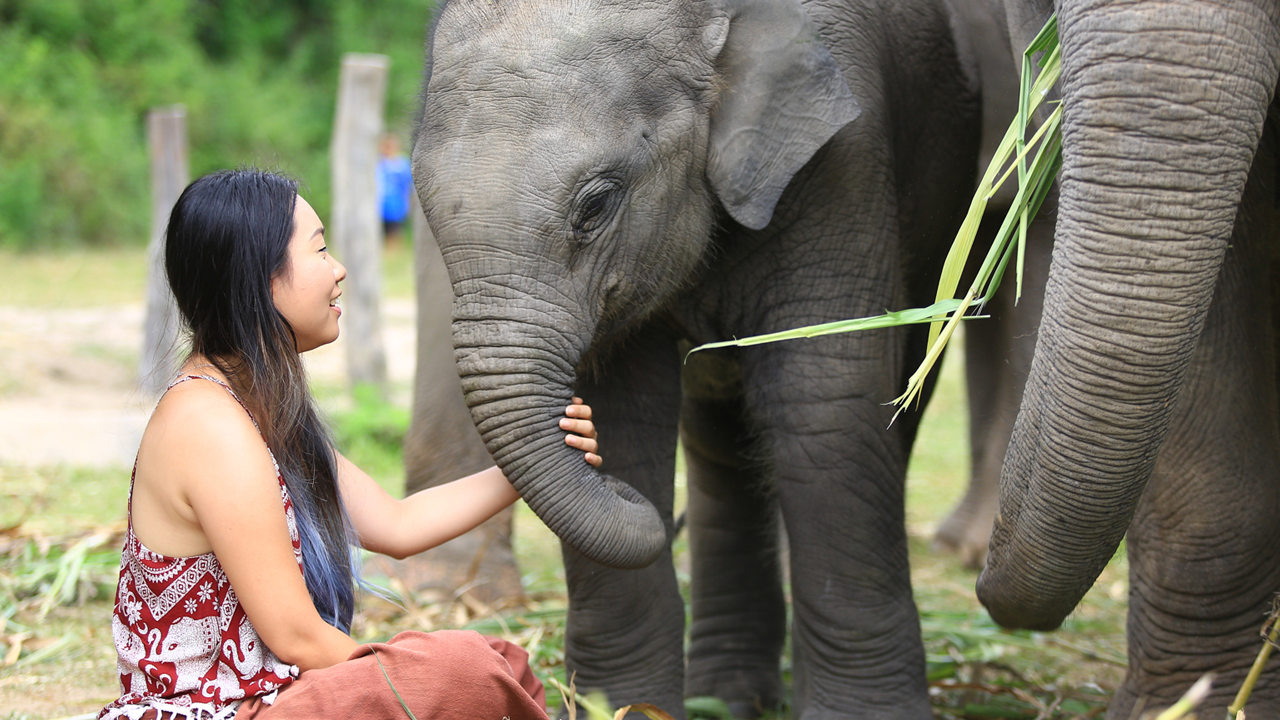
Celebrating a Decade of Global Experiences
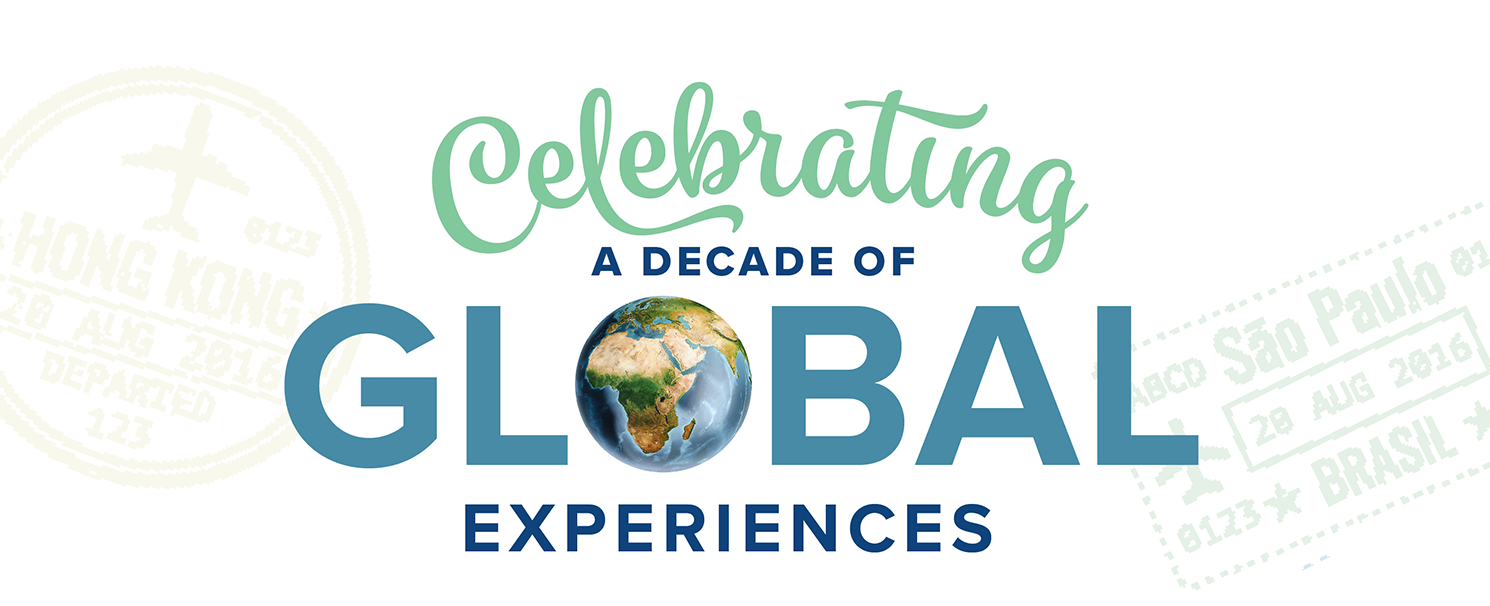
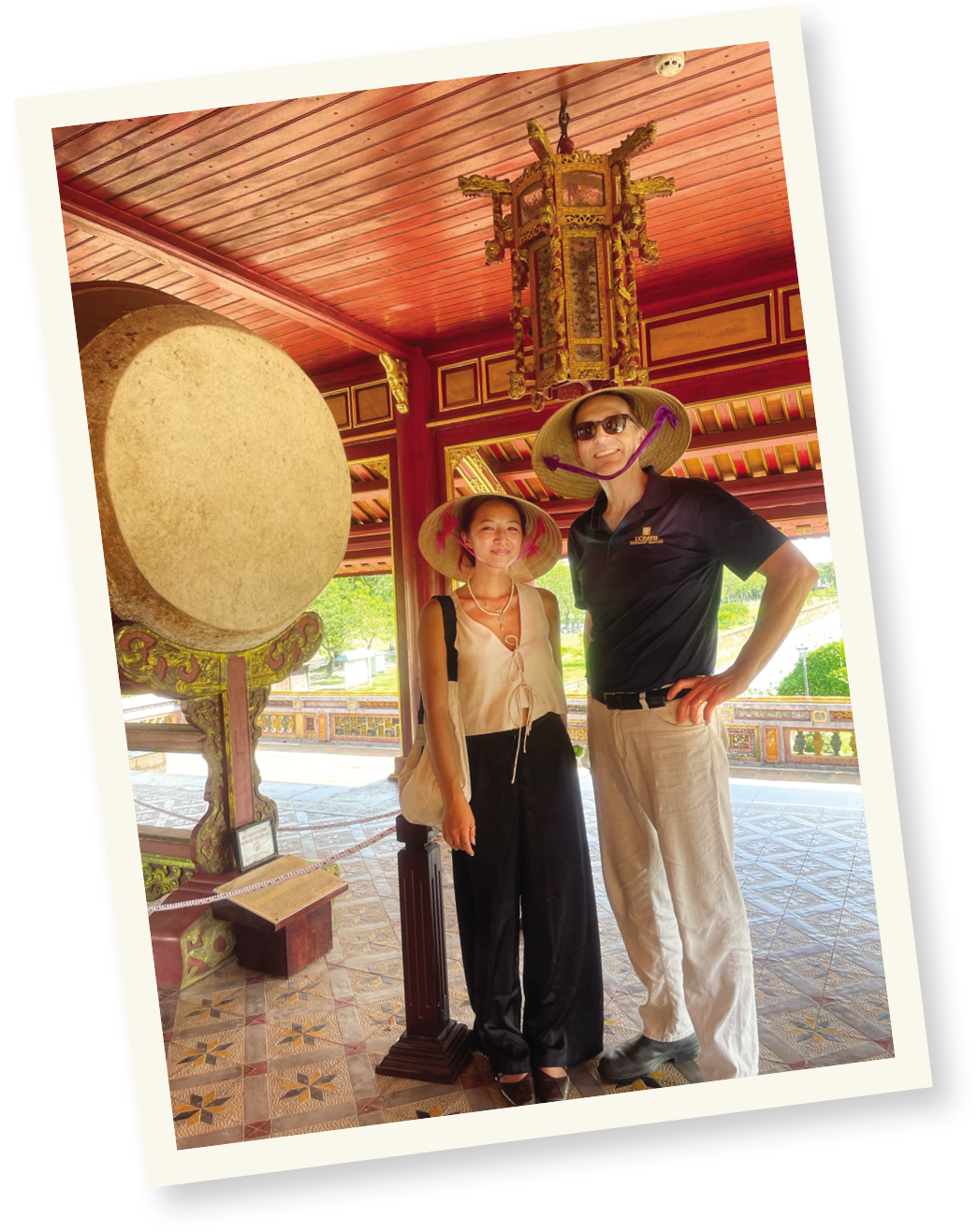
While Nhung Nguyen, Class of 2026, grew up in the United States, she and her family maintained deep cultural ties to their homeland in Vietnam. Thanks to the support of the Office for Global Programs, Nguyen was able to spend eight weeks last summer in Hue, an imperial city located in the heart of the country.
Under the mentorship of Dr. Hien Bui, who visited UC Davis from Hue University during the USDA Faculty Exchange Program of 2023, Nguyen engaged in a variety of meaningful experiences. She performed her first spay and neuter surgeries, and helped treat patients through home visits. She organized journal club teaching seminars for Vietnamese veterinary students, translating classes between English and Vietnamese. That role included researching journal articles and preparing presentations on infectious disease management, biosecurity, and prevention of antibiotic resistance—all prevalent One Health challenges in Vietnam.
I was reminded that empathy and compassion are universal languages.”
—Nhung Nguyen, Class of 2026
“Understanding my home country in both a veterinary and cultural capacity gave me deeper insights into myself and the communities around me,” Nguyen said. “I was reminded that empathy and compassion are universal languages. In reconnecting with pieces of my identity, I felt eastern and western cultures intertwine, not defined by, but uplifted by their shared differences and similarities.”
For the past decade, the school’s Office for Global Programs has offered students like Nguyen transformative opportunities in countries from Norway to Patagonia and every latitude in between. To date, the program has allocated more than $500,000 to more than 220 DVM students in 50 destinations worldwide to engage in summer externships, fellowships, and senior rotations. The experiences broaden their clinical and research skills, allow them to work in diverse communities, expand their personal and professional worldviews, and give them an appreciation for the role of veterinary medicine in addressing global health needs today and in the future.
Students who participate in a Global Programs ... engage in research and educational opportunities that often reshape or redefine their career paths in veterinary medicine.”
—Dr. Woutrina Smith, Associate Dean, Global Programs
“Students who participate in a Global Programs opportunity often come back to UC Davis changed in some fundamental fashion,” said Dr. Woutrina Smith, who serves as associate dean of Global Programs. “Their experiences offer a uniquely concentrated time of personal growth while they engage in research and educational opportunities that often reshape or redefine their career paths in veterinary medicine.”
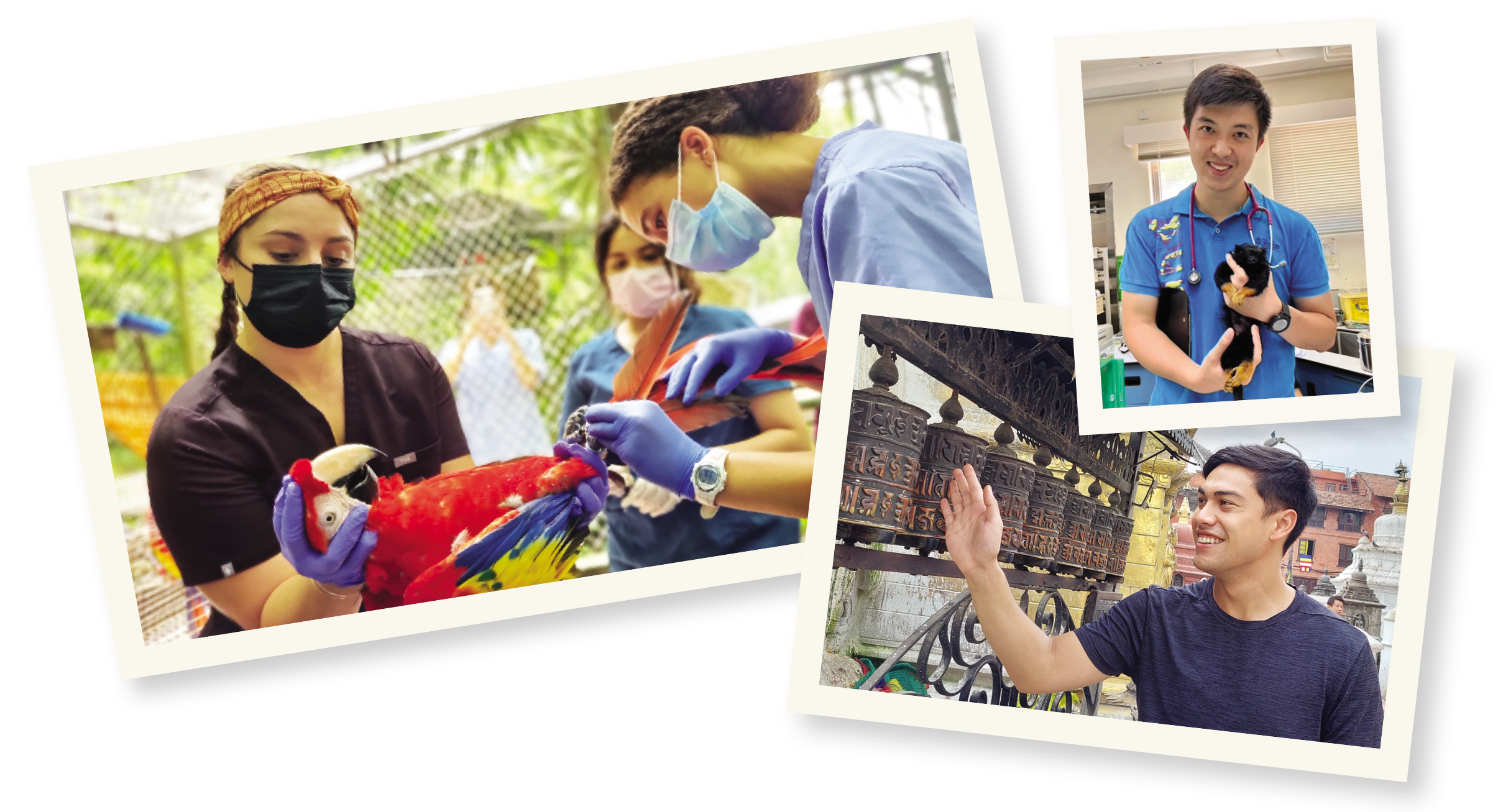
History
Long before Global Programs was formally established in 2014 under the leadership of Dean Emeritus Michael Lairmore, Professor Emeritus David Hird helped establish an Office of International Programs. Early in his DVM training, Hird had visited Chile to work with dairy cattle and carthorses. Despite his original plan of staying for one year, Hird stayed four years and cited the experience as so transformative that he went on epidemiology rather than small animal clinical practice. It was this deep connection with international experiences that led him to help DVM students find similar opportunities after he joined the faculty of the UC Davis veterinary school.
Following Hird’s retirement in 2008, Dr. Lisa Tell took on the leadership of that program. She had traveled internationally as an undergraduate for a program in wildlife disease management and pathology in South Africa. During her residency, she sought more global opportunities, working with rhinos, elephants, and oxpeckers in South Africa, giant pandas in Mexico, and iguanas in the Cayman Islands.
It’s a way to see the world through a different lens, appreciate what veterinary medicine does, and the impact of it in different countries and animals.”—Dr. Lisa Tell
“It’s a way to see the world through a different lens, appreciate what veterinary medicine does, and the impact of it in different countries and animals,” she said.
As director, Tell helped refine the program and increased the emphasis on travel safety of students, staff, and faculty by proactively encouraging travel insurance and working with the Office of the Campus Counsel to decide when programs were unsafe.
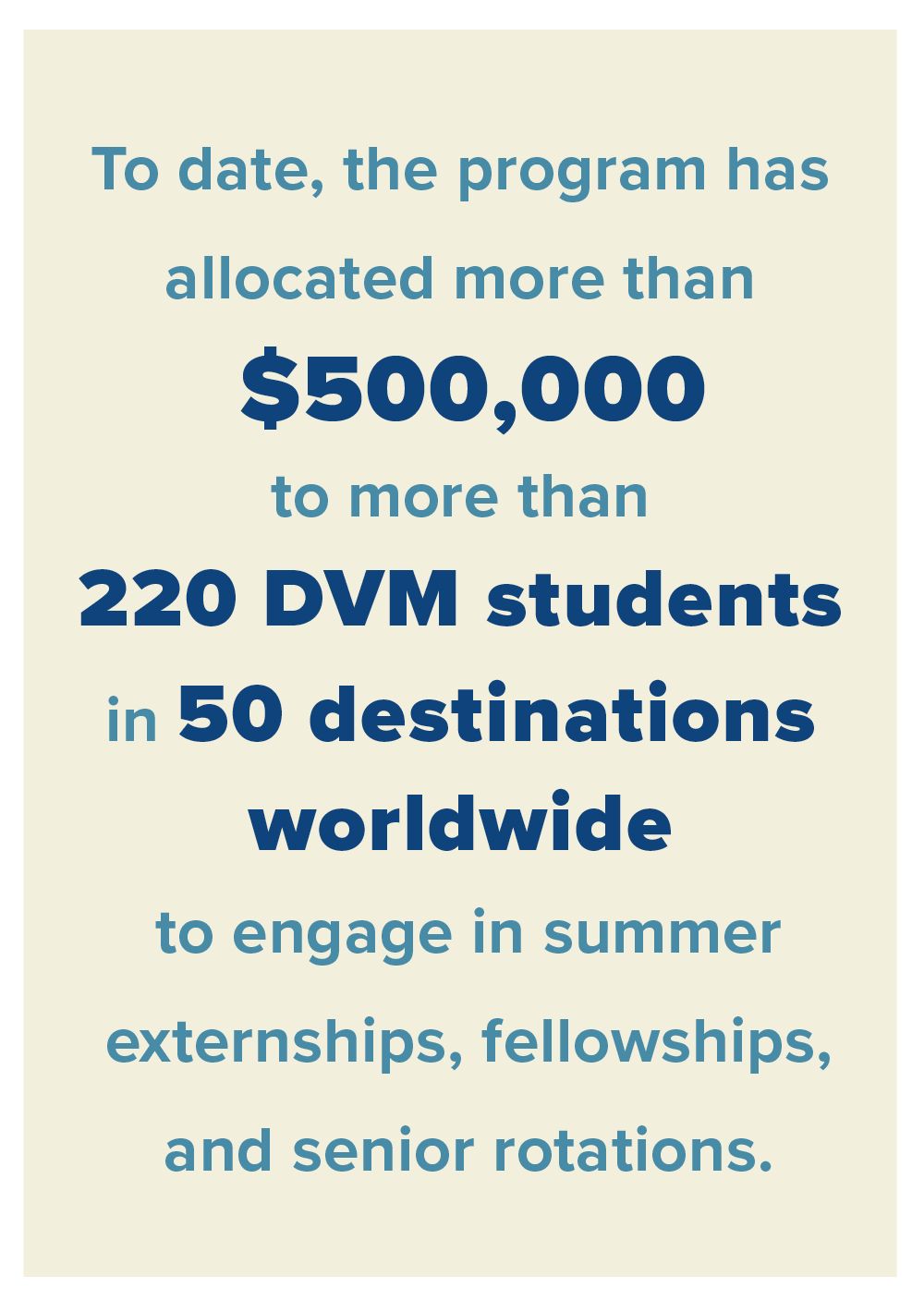
Under both Hird and Tell, the Office of International Programs was supported by a modest fund of $10,000 annually, and to pursue preventive medicine and their directorships were 10 percent positions without the support of dedicated staff. In order to truly grow and serve more students, the program needed additional funding and administrative support. So Lairmore appointed Professor Emeritus Pat Conrad as the first associate dean of the Office for Global Programs that was then launched in January 2015 following the recruitment of then staff Director Dr. Paulina Crook. Conrad worked with the Dean’s Office of Advancement to garner philanthropic support—including a $50,000 endowment fund gifted by the Class of 1968, Hird’s graduating class.
“Every year, we witnessed more enthusiasm and involvement from donors about how Global Programs impacted the lives and future careers of our DVM students as well as the faculty members involved,” said Conrad who retired in 2021. “It was an exciting time to be a part of that growth and to see opportunities expand in terms of the number of students we could support, the countries they visited and the variety of activities in which they could participate.”
Some of that program expansion included the development of a One Health course in South Africa through a partnership with the University of Pretoria, as well as a 4-week One Health Intensive Field Course in Sri Lanka with the University of Peradeniya. Global Programs has also provided support for the Rx One Health Field Institute that was developed by the school’s One Health Institute in 2017. Designed as an experiential learning opportunity for early career professionals and graduate students, the Rx One Health Field Institute weaves across several disciplines including ecology, epidemiology, conservation, and leadership.
Faculty opportunities and engagement have also expanded through research and onsite implementation with global the largest expansions in the past five years was through the USAID One Health Workforce Next Generation Project—a $60 million training grant from the U.S. Agency for International Development. During its lifespan, this project fostered collaborations between the school and more than 100 universities in 17 countries in Africa and Southeast Asia, in which more than 60,000 people were trained on the One Health approach.
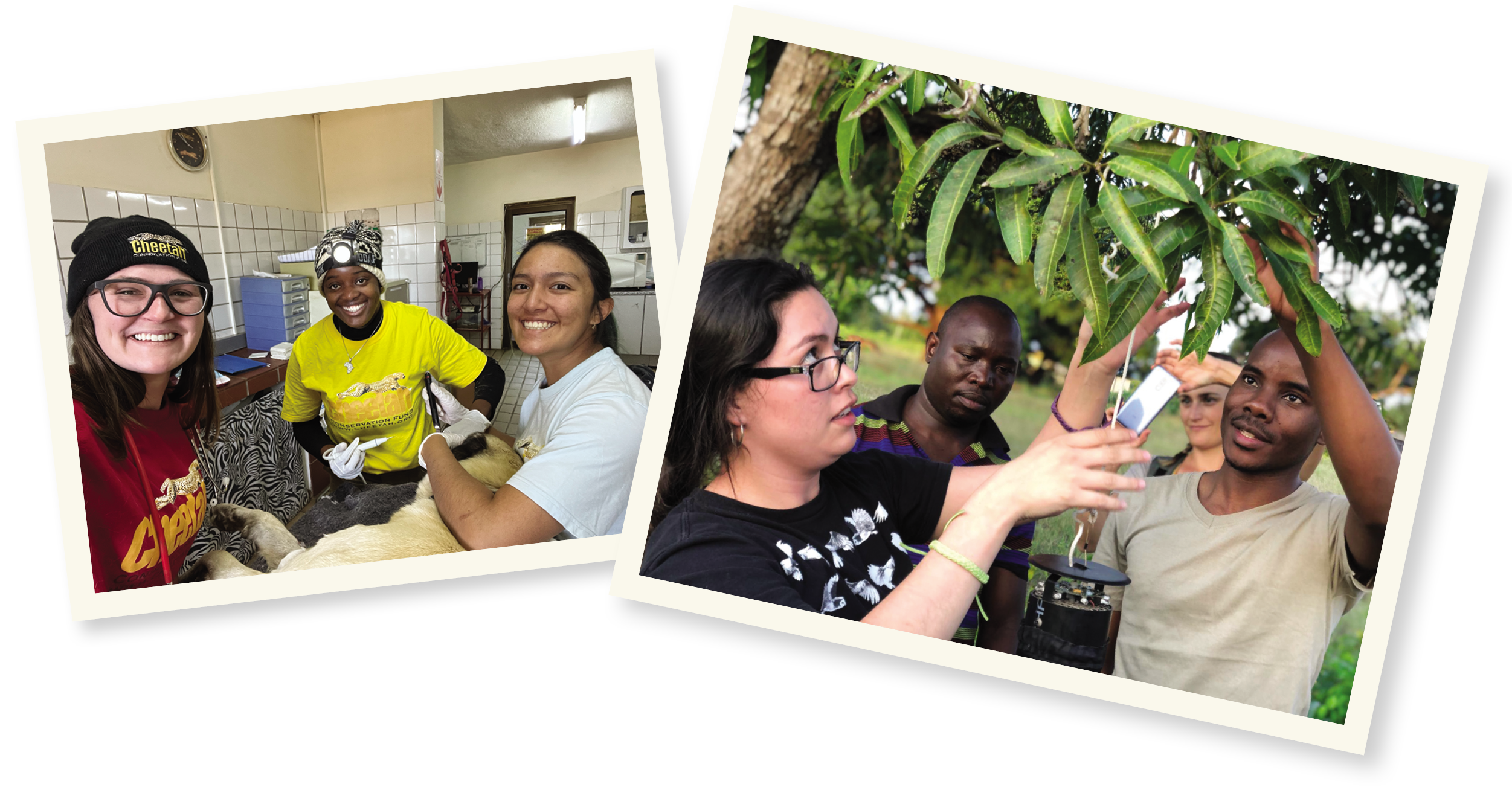
“Our global partnerships set the stage for us to develop the One Health Workforce Academy—a platform for online education around the world,” Smith said.
Looking to the future, one of Global Program’s main initiatives is to expand online opportunities, creating further global outreach for the school. Online certificates and master’s programs would allow people around the world to receive training without having to go through the hurdles of moving to a new country or state.
“We work with colleagues in many different countries who say they would love to enroll in the Masters of Preventive Veterinary Medicine program or to be able to take a course at UC Davis, but can’t move here, leave their job, or get a visa,” said Smith. “We hope to make that a reality in the near future.”
If we can learn to think globally but act locally, we can each make a difference.
—Dr. Woutrina Smith
Sharing her perspective on why international experiences are so valuable, Smith said: “If we can learn to think globally but act locally, we can each make a difference. If many people around the world consider how we’re connected in food systems, veterinary medicine, public health, and more, and create change in their communities that reflect those global values, we can all make a small difference and that adds up.”
For more information about Global Programs, visit: www.vetmed.ucdavis.edu/global-programs
Where Are They Now?
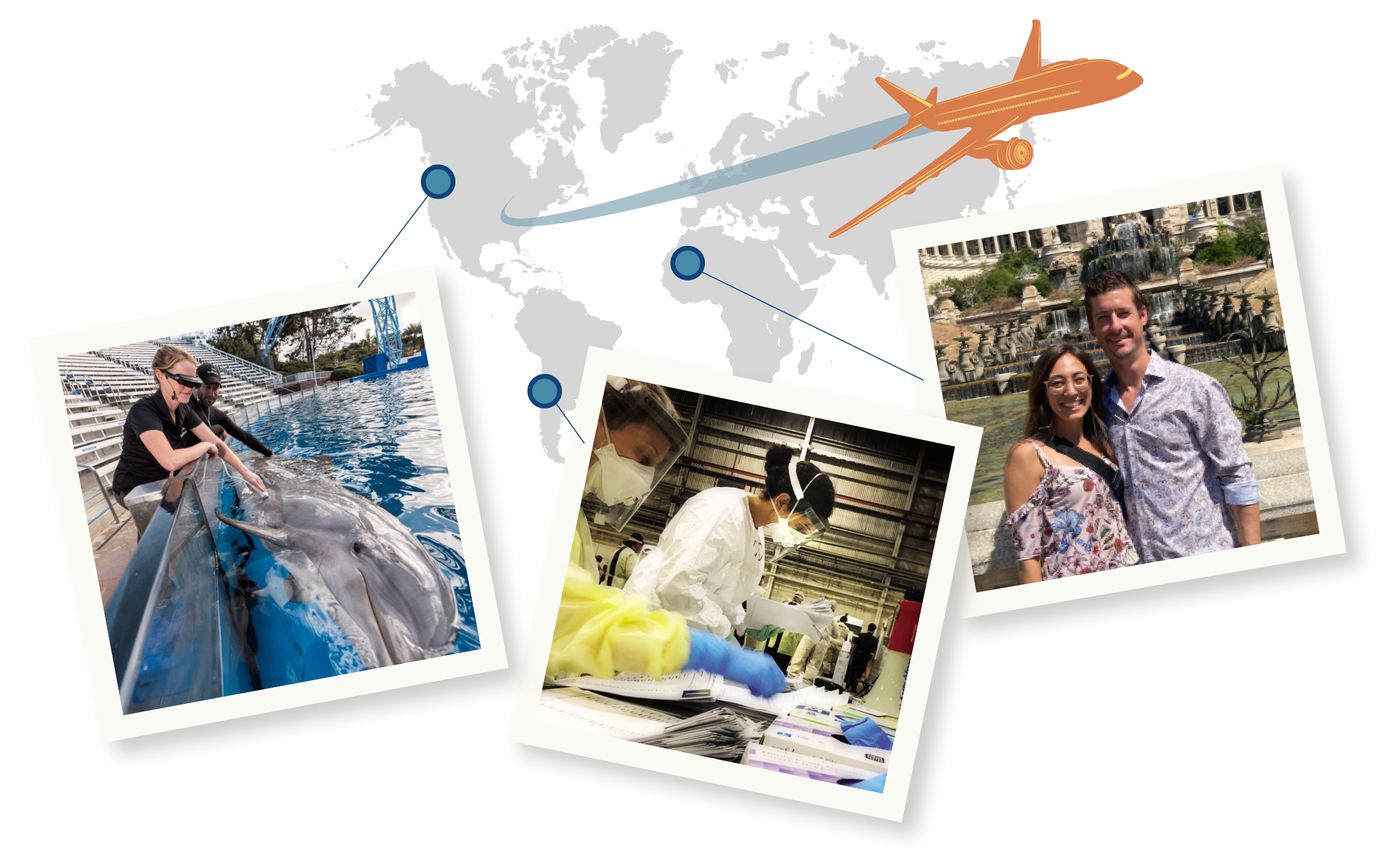
Kelsey Herrick, DVM ’15
As a veterinarian at SeaWorld San Diego, Kelsey Herrick provides veterinary care for thousands of animals within the park as well as a large population of rescued wild animals. Research is a significant part of her job—her roles can involve field work, research for conservation, and health assessments for wild animals. She participated in an externship at the Vancouver Aquarium in British Columbia. “Aquatic animal medicine is a lifelong learning career, I learn something new and weird every day about the animals I care for, but without a solid knowledge foundation and opportunities to meet mentors, it would have been impossible to get started. Those connections with mentors and like-minded peers last a lifetime and have helped to pave the road for my career.”
Radhika Gharpure, DVM ’16, MPH
Radhika Gharpure (in white PPE, center of image) is an Epidemiology Lead at the Coalition for Epidemic Preparedness Innovations (CEPI), providing technical expertise to support vaccine development for priority pathogens with epidemic or pandemic potential. Radhika’s 4th year externship during her DVM training years gave her the opportunity to understand the day-to-day workings of a ministry of health in another country, Chile. “This experience gave me a sense of purpose early in my career path. I was able to translate epidemiology concepts into on-theground fieldwork and public health implementation. Working with mentors in a different language and cultural context also helped me develop a strong value for cultural awareness and humility that I carry with me through today.”
James Kincheloe, DVM ’16, MPH, DACVPM
James Kincheloe spent a month in Uganda developing disease surveillance systems and teaching courses to farmers and animal health workers with Veterinarians Without Borders, an NGO dedicated to promoting animal wellbeing, human health, and economic development both domestically and internationally through his UC Davis Global Programs experience. “I have used this experience to inform activities at all of the jobs I have held in my career, especially those that have dealt with international development and engagement,” he said. Currently he is a Senior Management Analyst at Noblis, a nonprofit organization that provides scientific solutions for government, and provides consultation at the National Biosurveillance Integration Center within the Department of Homeland Security. The center analyzes outbreaks and other infectious disease situations on a global scale, and distributes information to audiences ranging from local and state public health personnel, to senior government officials.
